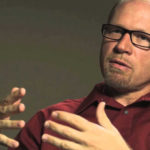We run our website the way we wished the whole internet worked: we provide high quality original content with no ads. We are funded solely by your direct support. Please consider supporting this project.

Evil, St. Augustine, & the “Secret” Higher Harmony
The problem of evil constitutes the single most difficult challenge to Christian theism. Volumes upon volumes have been written with the express purpose of rationally reconciling the belief in an all-good and all-powerful God with the reality that life is frequently an inescapable nightmare. Indeed, it is not overstating the case to claim that no single theological problem has occupied more intellectual energy, time and ink than this one.
The core problem is that most equate power with control, and thus omnipotence with omnicontrol, an equation that forces the problem of evil to be seen as a problem of God’s sovereignty. If it is accepted that God is all-loving and all-powerful, and if maximum power is defined as maximum control, then by definition there seems to be no place for evil. If goodness controls all things, all things must be good.
The reality of our experience and the assumptions of our theology seem to contradict one another.
One common approach of dealing with this contradiction is to retain the view that God is all-loving and all-powerful by simply denying the world is evil. Remarkably, this view has exercised a strong influence on the church’s reflections on theodicy throughout history. Some of the church’s most weighty authorities, such as Boethius and Augustine, explicitly embraced it.
This view in essence maintains that what looks like evil does so simply because of our limited perspective on the “universal good.” If we could but view any “evil” event from God’s transcendent, panoramic, timeless perspective, we would supposedly see how any given event “fits” in with the God-ordained harmonious cosmic whole. However horrifying the event may appear to our limited perspectives, from God’s universal perspective, and in accordance with God’s meticulous universally controlling will, the “evil” event actually contributes to the beauty of the whole.
“Evil does not exist at all,” Augustine said, “and not only for you [God], but for your created universe, because there is nothing outside it which could break in and destroy the order which you have imposed upon it.”
What seems evil is actually a dimension of a higher harmony from this perspective. Therefore, Augustine states, we ought to regard everything as flowing from God’s sovereign loving hand. Even when innocent persons suffer unjustly at the hands of another person, Augustine maintains, “he ought not to attribute [his suffering] to the will of men, or of angels, or of any created spirit, but rather to His will who gives power to wills.”
Such an approach has some appeal when evil is considered merely at an abstract level, as “the absence of the good.” It is certainly comforting to believe that there is a silver lining in every cloud. But when evil is considered in all its dimensions at a concrete level, the supposition that there is a higher perspective that harmonizes all the conflicting parts of this sometimes nightmarish earthly existence simply becomes unacceptable.
However much theologians may protest, the affirmation, if thought through consistently, seems to make God out to be a kind of Nazi. Hitler and most Nazis believed that the extermination of the Jews was “good” only in the sense that it was a necessary step toward “the greatest good.” From this perspective, the only mistake that the Nazis made was in determining just what “the greatest good” was.
In addition, according to Scripture, God has a passionate hatred toward all evil. It is certainly not clear how God could hate what he himself wills and sees as a contributing ingredient in the good of the whole. If all things ultimately play themselves out according to a prescribed divine plan, how can God genuinely hate anything?
The central scriptural theme, however, presupposed that evil exists for God as well as for humans, that God does not will it, and thus that some beings (those who are evil) have the ability to act against God’s will. It requires the understanding that it is possible for some beings (angels and humans at least) genuinely to resist, and even thwart, whatever blueprint God might wish their lives to follow. It requires accepting the view that God, for whatever reasons, designed the cosmos such that he does not necessarily always get his way, and may in fact detest the way some things turn out. It requires the view that God does not monopolize power, and hence that omnipotence cannot be equated with meticulous omnicontrol. It therefore requires that we do not find solace in any view that would try to reduce evil down to an aesthetic antithesis that secretly contributes to the higher harmony of the cosmic whole.
—Adapted from God at War, pages 43-47
Image by roberthuffstutter via Flickr
Category: General
Tags: Augustine, Blueprint Worldview, Free Will, God at War, Problem of Evil, Spiritual Warfare
Topics: The Problem of Evil
Related Reading

4 Reasons to Wake Up to the Warfare Worldview
Image by postbear via Flickr A view of the world that grounds the problem of evil in spiritual warfare is not one that many modern people find easy to accept. To many contemporaries, the notion is preposterous that real, semi-autonomous, self-determining, and invisible spirits exist that can and do influence our lives. The whole thing sounds…

Are you Afraid of Demons?
I remember learning about germs in fourth grade. We were told our world was saturated with tiny invisible creatures that can infect wounds and make us sick. I immediately stopped sharing already-chewed gum with other kids, stop using my sister’s toothbrush and started washing my hands after going to the bathroom. Most kids had similar…

Lord Willing? Part 2
In Part 2 of Greg’s interview of Jessica Kelley about her book Lord Willing?, they discuss the theology that helped Jessica through her son Henry’s illness and death. You can find Part 1 of the interview here, and part 3 here.

Why Can’t God Stop Evil? The Thomas J. Oord Interview (podcast)
Greg and Thomas talk about Open Theism and how Greg’s views differ from Thomas’s. Theology nerds, get your compass and your flashlight and prepare to go DEEEEEP in the weeds! Thomas’s book: God Can’t Episode 487 http://traffic.libsyn.com/askgregboyd/Episode_0487.mp3

Did Jesus Say That God Causes Blindness?
As he went along, he saw a man blind from birth. His disciples asked him, “Rabbi, who sinned, this man or his parents, that he was born blind?” “Neither this man nor his parents sinned,” said Jesus, “but this happened so that the works of God might be displayed in him (Jn 9:1-3, NIV) Commentators typically appeal to this passage…

Defining Love
If God’s eternal essence is love, as discussed in this post, then we must ask: What does this confession actually mean? We must explore this question carefully because “love” has been defined in many theological streams in ways that seem contradictory to the kind of love revealed by Christ. As with so many other things,…
